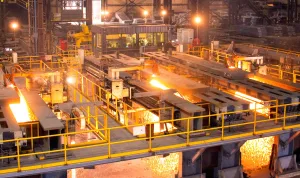The Automotive Industry’s Influence on Steel Stocks: An In-Depth Analysis

The automotive industry, a major consumer of steel, significantly impacts the performance of steel stocks. As vehicle production and demand fluctuate, so does the demand for steel, affecting steel companies’ profitability and stock performance. This article delves into the intricate relationship between the automotive industry and steel stocks, examining key trends, market dynamics, and investment insights.
1. Understanding the Relationship Between Automotive Industry and Steel Demand
1.1. Steel in Automotive Manufacturing
- Structural Components: Steel is widely used in car bodies, chassis, and structural components due to its strength and durability.
- Engine Parts: High-strength steel alloys are essential for engine parts and other critical components.
- Safety Features: Advanced high-strength steels (AHSS) are used in safety features like crumple zones and reinforcements.
1.2. Production Correlation
- Direct Impact: Increases in vehicle production directly boost steel demand, while production slowdowns lead to reduced steel consumption.
- Supply Chain Interdependencies: The automotive supply chain’s health, including parts and materials supply, influences steel demand.
2. Key Trends Affecting Steel Stocks Through the Automotive Industry
2.1. Technological Advancements
- Electric Vehicles (EVs): The rise of EVs is reshaping steel demand, with a focus on lightweight materials to improve energy efficiency.
- Innovation in Steel Alloys: Development of new steel alloys to meet the specific needs of modern automotive manufacturing.
2.2. Regulatory Changes
- Emission Standards: Stricter emission regulations are pushing the automotive industry to innovate, impacting steel composition and usage.
- Safety Regulations: Enhanced safety standards increase the demand for high-strength steel in vehicle construction.
2.3. Economic Cycles
- Economic Growth: During economic booms, higher disposable incomes lead to increased vehicle sales, boosting steel demand.
- Recessions: Economic downturns typically result in decreased vehicle production and reduced steel consumption.
2.4. Trade Policies
- Tariffs and Trade Agreements: Changes in trade policies can affect steel prices and availability, influencing the automotive industry’s production costs and steel demand.
3. Investment Insights: Analyzing Steel Stocks in Light of Automotive Industry Trends
3.1. Market Leaders
- Diversified Steel Producers: Companies with diversified product portfolios and global market presence are better positioned to capitalize on automotive trends.
- Innovative Firms: Steel companies investing in advanced materials and technologies are likely to benefit from the evolving automotive landscape.
3.2. Financial Health
- Balance Sheet Strength: Strong financials enable steel companies to invest in R&D and withstand market fluctuations.
- Operational Efficiency: Efficient operations and cost management are critical for maintaining profitability during automotive industry downturns.
3.3. Long-Term Prospects
- Sustainability Focus: Companies emphasizing sustainable practices and eco-friendly products align well with the automotive industry’s shift towards greener solutions.
- Strategic Partnerships: Collaborations with automotive manufacturers can provide stability and growth opportunities for steel companies.
4. Case Studies: Steel Stocks Influenced by the Automotive Sector
4.1. ArcelorMittal
- Overview: As one of the world’s leading steel producers, ArcelorMittal supplies steel to major automotive manufacturers.
- Impact: Innovations in high-strength steel products for automotive applications have bolstered the company’s market position.
4.2. Nippon Steel Corporation
- Overview: A major player in the Japanese steel industry, Nippon Steel has strong ties to the automotive sector.
- Impact: Investments in advanced steel technologies for lightweight and high-strength applications cater to the needs of the automotive industry.
4.3. Tata Steel
- Overview: Tata Steel, a prominent Indian steel manufacturer, has a significant presence in the automotive steel market.
- Impact: The company’s focus on sustainable and innovative steel solutions aligns with the automotive industry’s evolving demands.
Conclusion
The automotive industry’s influence on steel stocks is profound, driven by factors such as technological advancements, regulatory changes, economic cycles, and trade policies. Understanding this relationship is crucial for investors aiming to make informed decisions in the steel market. By keeping an eye on key trends and market dynamics, investors can navigate the complexities of the steel and automotive industries, capitalizing on opportunities and mitigating risks.



